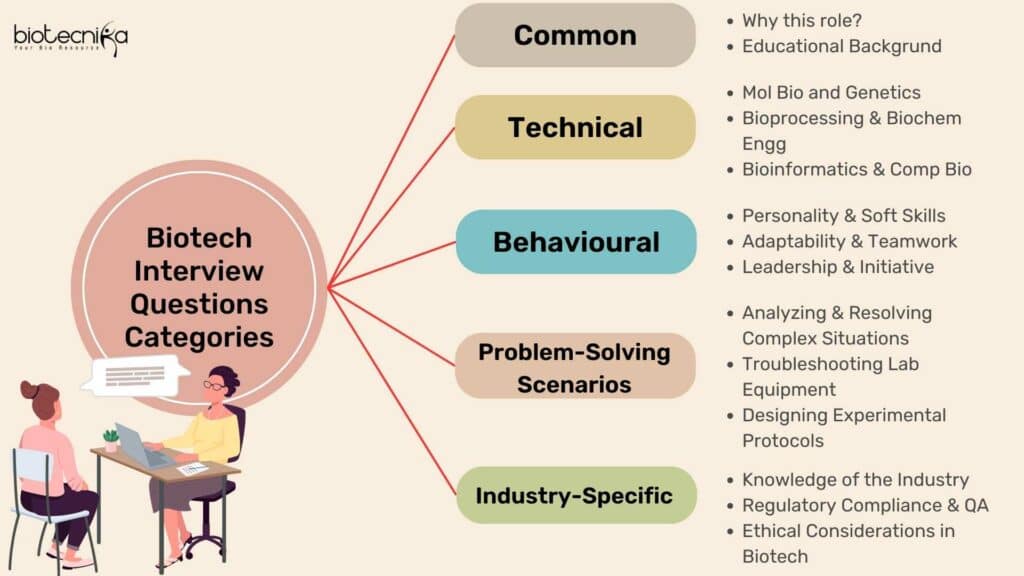BioTech interviews are a critical part of the hiring process in the biotechnology industry. They provide employers with an opportunity to assess a candidate’s knowledge, skills, and suitability for the role. In this article, we will dive into the world of BioTech interviews, uncovering questions that you may have never thought they would ask. Whether you’re a fresh graduate or an experienced professional, understanding the types of questions asked in BioTech interviews and how to answer them can significantly increase your chances of success.
Importance of BioTech Interviews
BioTech interviews hold immense importance as they serve as a gateway to securing a job in the highly competitive biotechnology field. Employers use interviews to evaluate a candidate’s technical expertise, problem-solving abilities, communication skills, and cultural fit within the organization. It is essential to prepare thoroughly and be ready to tackle a wide range of questions to stand out among other candidates.
Common Interview Questions
- Why are you interested in the biotechnology industry?
- Can you explain your experience with laboratory techniques and equipment?
- How do you stay updated with the latest developments in the field of biotechnology?
- Describe a challenging project you worked on and how you overcame obstacles.
- What is your approach to collaborating with interdisciplinary teams?
Technical Questions
Mastering the Technical Side
Technical questions form a significant part of BioTech interviews. Interviewers aim to assess a candidate’s knowledge and proficiency in core technical areas. It is crucial to demonstrate expertise in relevant concepts, laboratory techniques, data analysis, and instrumentation. Here are a few common technical questions asked in BioTech interviews:
A: Molecular Biology and Genetics
- Explain the process of PCR and its applications.
- What are the different types of gene mutations and their effects?
- Describe the principles and applications of DNA sequencing techniques.
B: Bioprocessing and Biochemical Engineering
- How do you optimize fermentation processes for biopharmaceutical production?
- What are the key factors to consider when scaling up a bioreactor?
- Discuss the challenges and solutions in downstream purification of biologics.
C: Bioinformatics and Computational Biology
- How do you analyze next-generation sequencing data?
- Describe your experience with bioinformatics tools and databases.
- What are the steps involved in protein structure prediction?
Behavioural Questions
A: Showcasing Your Personality and Soft Skills
Behavioral questions aim to assess a candidate’s interpersonal skills, problem-solving capabilities, and ability to work in a team. These questions provide insights into your behavior, decision-making processes, and adaptability. Here are a few behavioral questions that may arise in BioTech interviews:
B: Adaptability and Teamwork
- Describe a situation where you had to adapt to a significant change in a project.
- How do you handle disagreements or conflicts within a team?
- Discuss a time when you collaborated with colleagues from different disciplines.
C: Leadership and Initiative
- Can you provide an example of a project you led from conception to completion?
- How do you motivate and inspire others in a team setting?
- Share an instance when you identified a problem and took the initiative to solve it.
Problem-Solving Scenarios
A: Analyzing and Resolving Complex Situations
Problem-solving scenarios test a candidate’s ability to think critically, analyze complex situations, and propose practical solutions. These questions evaluate your problem-solving skills, attention to detail, and logical reasoning. Here are a few examples of problem-solving scenarios that may be presented during BioTech interviews:
B: Troubleshooting Laboratory Equipment
- You encounter an unexpected error while operating a high-performance liquid chromatography (HPLC) system. Walk us through your troubleshooting process.
- How would you approach identifying the cause of a sudden decrease in cell viability in a cell culture experiment?
- You observe inconsistencies in the results of an ELISA assay. How would you investigate and resolve this issue?
C: Designing Experimental Protocols
- Design an experiment to investigate the efficacy of a new drug candidate for cancer treatment.
- Develop a protocol to optimize the production of a recombinant protein in a bacterial expression system.
- Propose a strategy to determine the mechanism of action of an unknown enzyme.
Industry-Specific Questions
A: Demonstrating Your Knowledge of the Industry
Industry-specific questions delve into your understanding of the biotechnology sector, recent advancements, and regulatory considerations. These questions aim to evaluate your knowledge of industry trends, awareness of ethical concerns, and ability to apply theoretical concepts to real-world scenarios. Here are some industry-specific questions commonly asked in BioTech interviews:
B: Regulatory Compliance and Quality Assurance
- How do you ensure compliance with Good Manufacturing Practices (GMP) in a laboratory setting?
- What steps would you take to validate an analytical method for quality control purposes?
- Discuss the importance of documentation and record-keeping in a regulated biotech environment.
C: Ethical Considerations in Biotechnology
- What ethical factors should be considered when conducting research involving human subjects?
- How do you navigate conflicts of interest between commercial objectives and patient welfare?
- Explain the role of biotechnology in addressing global challenges like food security and environmental sustainability.

Research and Preparation
A: Success Lies in Preparation
Proper research and preparation are key to performing well in BioTech interviews. Here are some tips to help you prepare effectively:
Dos and Don’ts
Nailing the Interview
During a BioTech interview, it’s important to keep in mind certain dos and don’ts to leave a positive impression on the interviewers. Here are some key points to remember:
Mock Interviews
Practice Makes Perfect
Conducting mock interviews can significantly improve your performance in BioTech interviews. Engaging in practice sessions aids in building confidence, honing your responses, and pinpointing areas for improvement. Consider the following tips for conducting mock interviews:
Body Language and Communication Skills
Non-Verbal Communication Matters
In BioTech interviews, your body language and communication skills play a crucial role in conveying your confidence and professionalism. Here are some tips to help you make a positive impression:
Follow-up and Thank You Notes
Etiquette Matters
After the interview, it’s essential to follow up with a thank you note to express your gratitude and reiterate your interest in the position. Consider the following guidelines for post-interview etiquette:
Conclusion
In conclusion, BioTech interviews require thorough preparation and knowledge of both technical concepts and behavioural skills. Understanding the types of questions typically asked and how to answer them effectively can significantly enhance your chances of success. By researching the industry, practicing mock interviews, and showcasing your expertise and personality, you can excel in BioTech interviews and secure the job of your dreams.
FAQs
Q1: How can I prepare for a BioTech interview effectively?
A1: To prepare for a BioTech interview effectively, start by researching the company and industry, and understanding the latest developments and trends. It is important to familiarize yourself with common technical concepts and laboratory techniques. Additionally, practice responding to both technical and behavioural questions. Conduct mock interviews to enhance your performance and confidence. Lastly, ensure to dress in a professional attire and arrive punctually for the interview.
Q2: What are some common technical questions asked in BioTech interviews?
A2: Common technical questions in BioTech interviews can vary, but they often focus on molecular biology, genetics, bioprocessing, bioinformatics, and more. Examples include explaining PCR and its applications, discussing gene mutations and their effects, optimizing fermentation processes, analyzing next-generation sequencing data, and describing protein structure prediction methods.
Q3: How should I approach behavioural questions in a BioTech interview?
A3: When facing behavioural questions in a BioTech interview, it’s essential to provide specific examples from your past experiences. Use the STAR (Situation, Task, Action, Result) method to structure your responses. Highlight your problem-solving skills, adaptability, teamwork, leadership, and ability to work in interdisciplinary teams. Demonstrate your communication skills and ethical decision-making abilities.
Q4: Is it necessary to conduct mock interviews before the actual interview?
A4: Conducting mock interviews before the actual interview is highly recommended. Mock interviews allow you to practice answering common and industry-specific questions, refine your responses, and improve your overall interview performance. They help you gain confidence, identify areas for improvement, and familiarize yourself with the interview process.
Q5: How important is post-interview etiquette, such as sending a thank you note?
A5: Post-interview etiquette, including sending a thank you note, is crucial. It demonstrates your professionalism, gratitude, and genuine interest in the position. A well-crafted thank you note allows you to express appreciation for the opportunity to interview and reiterate your qualifications and enthusiasm for the role. It leaves a positive impression on the interviewers and sets you apart from other candidates.



































